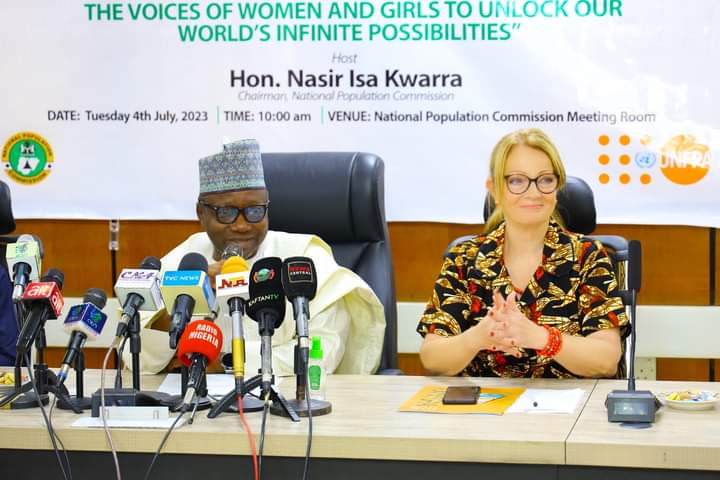By Ene Oshaba

The National Population Commission (NPC) has reemphasized the federal government’s commitment to addressing women issues, stressing that ‘achieving Gender Equality remains a task that must be done’ in order to attain peace, progress and prosperity in Nigeria and the world at large.
Chairman of the Commission Hon. Nasir Isah-Kwara stated this Tuesday in Abuja, during a press briefing in commemoration of the World Population Day (WPD) with theme, “Unleashing the Power of Gender Equality: Uplifting the Voices of Women and Girls to Unlock Our World’s Infinite Possibilities.”
According to him, the theme draws from the world’s attainment of the 8 billion population mark, addresses SDG 5: Achieve gender equality and empower all women and girls as highlighted in this year’s State of the World Population Report (SWOP), launched a few weeks back.
He added that it also urges Member States including Nigeria to ensure vulnerable population groups, particularly women and girls have chances to express their rights and have indiscriminatory access to make choices in a world of 8 billion people.
He therefore called on the government, parliamentarians at all levels, stakeholders, the civil society organizations; traditional and religious leaders, the media, donors, partners to secure and guarantee the empowerment of women and girls by lifting their voices across the nation so that they can be heard, acknowledged and responded to.
“The responsibility lies first with the Government to prioritize decisions and actions that provide women and girls all the opportunities through education, health-care services, jobs, resources and services to guarantee their exercising their Rights and Choices, noting that this is inclusive of those living with disability, irrespective of where they reside.
“I am hopeful beyond doubt, that our dear President who in his maiden speech, expressed commitment to addressing women issues as one his top priorities, will ensure Nigeria fulfils that commitment to realize the Power of Gender Equality, make progress on SDG 5, achieve population management and significant demographic transition,” said Isa-Kwara.
He noted further that Women and Girls represent almost (49.7%), half of the nation’s entire population, regretting that this unique population group, more often are neglected across all societies and communities and are not accorded the deserved attention and experience limited access to opportunities.
“Our population is currently estimated at slightly over 216 million, placing Nigeria as the sixth most populated nation in the world. Nigeria was listed among the nine countries in the world whose rapid population growth contributed to the 8 billion reach on November 15th 2022.
“The context of this year’s commemoration is a reminder that arouses attention and which requires actions that will facilitate sustainable creating of opportunities that will empower women and girls for a secure future for all.
He maintained that to address the perspectives of women and girls’ Rights and Choices to pave way for achieving SDG 5 “Achieving Gender Equity” – entails:”Securing unlimited Access to quality formal education and to be well-educated in Science, Technology, Engineering and Mathematics (STEM), including acquiring livelihood skills and entrepreneurships;”Securing planned and organized Access to decent work and employment outside the home and enjoying equal wages at par with their male counterpart to achieve economic empowerment; “Involvement in decision-making roles in many aspects of life, including leadership positions; “Undisruptive access to quality and affordable health care services including maternity services plus sexual and reproductive health care services;”Protection from marginalization and exclusivity at all levels, space and spheres;”To enjoy life/living free from all forms discriminatory laws, customs/norms and culture that limits their potentials including protection from gender-based violence and harmful practices like early/child/forced marriages that most time, results in unintended pregnancies that usually disrupts their education (most times for life), as well as expose their body to incontinent/inconvenience like Fistula and maternal deaths;
“The right to reproductive choices – chose when to marry, when to start having children, decide freely the number and spacing of children without any coercion or compulsion and discrimination; which is embedded in -“Rights to correct, detailed information about equitable access to family planning and family health and life education (in the language and terms they understand to help make informed choices);
“The extent to which this Rights is promoted and exercised, explains the impact of fertility on the social well-being of the population, particularly of women, adolescent girls and young people.”
“Therefore, to “Unleash the Power of Equality” is embedded in investing in and creating equitable access to quality education as necessary and sufficient conditions to allow women and girls opportunities to exercise their rights and choices,” Kwara stressed.
